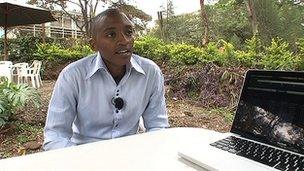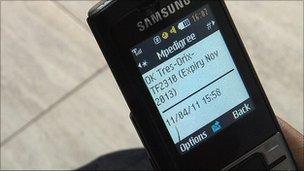Africa's business technology revolution gathers pace
- Published
WATCH: African ambitions focus on technology
Think African economies and you may think commodities, like oil and gas. But it may be time to start thinking tech innovation.
Countries around the continent have identified technology as a key weapon in the battle to boost prosperity - and that has sparked a tech revolution.
Sky high ambition
The continent's biggest economy has sky high ambitions.
South Africa is a serious contender to be home to a massive deep space telescope project called the SKA - or Square Kilometre Array. If the country beats off competition from Australia, its aerospace industry would receive a massive boost.
In fact, science and technology minister Naledi Pandor says the project would be "the largest science-based capital injection" Africa has ever seen.
That could mean more jobs and training in a cutting edge sector.
Young guns
But Africa's tech revolution could run out of steam unless it produces a new generation of innovators. That is why Kenya is taking steps to develop the talent that could help it get ahead of the game.
It is doing so with projects like m:lab - a consortium of stakeholders, including Nairobi University, which aims to hothouse talented mobile application developers.
Manager John Kieti says he is convinced Kenya is now a major world technology hub.
"[The mobile] is much cheaper to get, plus it can be used outside where there is no infrastructure like power," he says.
"Essentially, the mobile is going to be huge for us in terms of innovation, much more than the PC was a few years ago."
But it's not enough just to come up with good ideas - m:lab encourages innovators to focus on "demand driven" applications so they can be turned into viable businesses.
Pay it forward

Kariuki Gathitu is one of a new breed of Kenyan technology entrepreneurs
Kariuki Gathitu is one of the hottest properties in Kenya's tech sector.
He is a 27 year old software developer who has come up with an application to build on the country's already sophisticated mobile payments market, called M-Payer.
"It has come into the mobile money scene to solve a huge challenge," he says. "This challenge is basically the interoperability, aggregation and integration of mobile money."
It streamlines the whole process from start to finish and so aims to benefit consumer and business operator alike.
Mr Gathitu demonstrates how subscribers can pay bills, receive cash and transfer funds with just a few taps on a mobile, and cash will clear in minutes, not hours or days.
M-Payer claims it can end the 'cheque in post' culture that has ruined many small African firms, often operating on tiny margins, with little or no access to bank credit.
Wider markets
But the revolution is not only happening in Kenya.
Right across the continent, developers are coming up with applications designed to reflect local needs. In Ghana, it is now central to the health of both companies and individuals.

ShopAfrica53 advertises goods and services from across Ghana online
The country has no shortage of enterprise, but smaller operators can struggle to gain access to wider markets.
And that access can make the difference between stagnation and prosperity.
One company in Accra is itself making a living by using technology to boost the prospects of other businesses.
ShopAfrica53 is a kind of web-mall - advertising goods and services from a range of small businesses in Ghana.
This means the tiniest and most remote operator now has access to an international market. The website also handles logistics like collection and delivery of goods, and takes payment on behalf of the vendors.
The technology being used by ShopAfrica53 can be a lifeline for small entrepreneurs ranging from tailors to artists.
Fighting the fakes
IT is even being used to protect the health of individuals by tackling the potentially deadly problem of fake medicines. An application called mPedigree allows you to check the authenticity of drugs.

mPedigree lets you check the authenticity of drugs
You simply examine a special verification code on the bottle or packaging and send it, via free text, to a central online registry. An automatic response confirms whether the product is the real deal.
So far, only two of Ghana's major pharmacies have actually joined the system, but mPedigree says others have expressed interest.
"The drug industry in Ghana is worth about $750m (£465m) a year," says mPedigree's Selorm Branttie.
"Assuming about 10% of those are counterfeit drugs, we are talking about $75m a year going into the wrong hands... being invested into the wrong industries."
So whether it is fighting fake medicines or developing cutting edge telescopes, it's clear that Africa's technology is increasingly important in changing the lives of people across the continent.
"We cannot miss this train," says ShopAfrica53's chief executive Herman Chinnery-Hesse. "It's the only way to go."